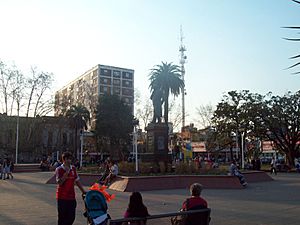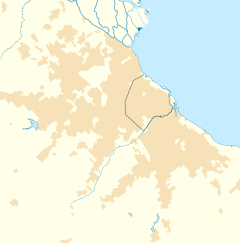San Miguel, Buenos Aires facts for kids
Quick facts for kids
San Miguel
|
|
|---|---|

San Miguel Square
|
|
| Country | |
| Province | |
| Partido | San Miguel |
| Founded | 1864 |
| Elevation | 28 m (92 ft) |
| Population
(2001 census [INDEC])
|
|
| • Total | 157,532 |
| • Density | 9,845/km2 (25,500/sq mi) |
| CPA Base |
B 1663
|
| Area code(s) | +54 11 |
San Miguel is a city located in the northwest part of Greater Buenos Aires, Argentina. It is about 30 kilometers (18 miles) away from the main City of Buenos Aires. San Miguel is the main city, or "county seat," of the San Miguel Partido. A "Partido" is like a county or local government area in Argentina. The city became part of Greater Buenos Aires in the early 2000s. In 2001, about 157,532 people lived there.
Contents
History of San Miguel
How San Miguel Started
San Miguel was once part of a very large farm, known as an estancia. This big farm belonged to General Ángel Pacheco. The city was officially started on May 18, 1864. It was first named San José del Pilar. A French-Argentine agronomist, Adolfo Sourdeaux, helped found it. An agronomist is a scientist who studies how to grow crops and manage land.
Growth and Changes Over Time
At first, San Miguel was part of the Pilar Partido. But soon after, the area was divided, and the town was renamed San Miguel. In 1870, a railway line, the Buenos Aires-Pacific Railway, was built through the town. This helped San Miguel grow and connect with other places.
Around the same time, the first schools opened in San Miguel. This was part of a plan by President Domingo Sarmiento to improve education in Argentina. In 1889, San Miguel became the main city for a new area called General Sarmiento Partido. Later, in 1994, that area was divided again. San Miguel then became the county seat for the new San Miguel Partido.
Over the years, San Miguel changed a lot. It used to be a quiet farming community. Now, it is a busy suburban area with many tall buildings. This growth has made it lose some of its old village feel. It has also put pressure on the city's services, like roads and water.
Economy and Local Businesses
San Miguel's economy mostly focuses on services. This means many people work in shops, offices, and other service-related jobs. There are also some industries in the city. For example, IPH has a factory there that makes steel cable.
A company called TeleRed broadcasts cable television from San Miguel. They provide TV services to many people in Greater Buenos Aires. Their channels include Señal Santa Marìa, which is a local Catholic channel. It offers family-friendly shows and religious programs.
Education in San Miguel
San Miguel is home to several important schools and universities. One of them is the National University of General Sarmiento. This university offers many different courses for students.
Another well-known place is the Colegio Máximo de San José. This is a Catholic school where students can study philosophy. Pope Francis, who is the leader of the Catholic Church, studied philosophy here when he was known as Jorge Bergoglio.
Getting Around San Miguel
It is easy to travel around San Miguel and to other cities. Many bus lines run through the city center. These buses help people get to different neighborhoods.
San Miguel also has several train stations. These stations are part of the San Martin and Urquiza commuter train lines. These trains make it simple for people to travel to and from Buenos Aires.
Climate in San Miguel
San Miguel has a mild climate. The summers are warm, and the winters are cool. It gets a good amount of rain throughout the year. The warmest month is January, and the coolest is July. Snow is very rare in San Miguel.
| Climate data for San Miguel, Buenos Aires (1991–2020, extremes 1961–2016) | |||||||||||||
|---|---|---|---|---|---|---|---|---|---|---|---|---|---|
| Month | Jan | Feb | Mar | Apr | May | Jun | Jul | Aug | Sep | Oct | Nov | Dec | Year |
| Record high °C (°F) | 40.5 (104.9) |
37.6 (99.7) |
37.1 (98.8) |
33.6 (92.5) |
30.0 (86.0) |
27.4 (81.3) |
30.7 (87.3) |
34.0 (93.2) |
35.1 (95.2) |
34.9 (94.8) |
37.2 (99.0) |
39.6 (103.3) |
40.5 (104.9) |
| Mean daily maximum °C (°F) | 30.1 (86.2) |
28.6 (83.5) |
26.9 (80.4) |
22.9 (73.2) |
19.1 (66.4) |
16.1 (61.0) |
15.4 (59.7) |
17.9 (64.2) |
19.6 (67.3) |
22.6 (72.7) |
25.9 (78.6) |
28.9 (84.0) |
22.8 (73.0) |
| Daily mean °C (°F) | 24.1 (75.4) |
22.9 (73.2) |
21.0 (69.8) |
17.1 (62.8) |
13.6 (56.5) |
10.9 (51.6) |
10.2 (50.4) |
12.2 (54.0) |
14.1 (57.4) |
17.2 (63.0) |
20.3 (68.5) |
22.9 (73.2) |
17.2 (63.0) |
| Mean daily minimum °C (°F) | 18.7 (65.7) |
17.9 (64.2) |
16.0 (60.8) |
12.3 (54.1) |
9.4 (48.9) |
6.7 (44.1) |
5.9 (42.6) |
7.2 (45.0) |
9.2 (48.6) |
12.2 (54.0) |
14.7 (58.5) |
17.2 (63.0) |
12.3 (54.1) |
| Record low °C (°F) | 6.9 (44.4) |
5.9 (42.6) |
0.9 (33.6) |
0.6 (33.1) |
−2.6 (27.3) |
−7.9 (17.8) |
−5.7 (21.7) |
−3.5 (25.7) |
−2.6 (27.3) |
−1.4 (29.5) |
1.8 (35.2) |
3.5 (38.3) |
−7.9 (17.8) |
| Average precipitation mm (inches) | 116.2 (4.57) |
130.7 (5.15) |
95.4 (3.76) |
114.3 (4.50) |
69.5 (2.74) |
49.8 (1.96) |
65.5 (2.58) |
64.6 (2.54) |
65.0 (2.56) |
118.6 (4.67) |
120.3 (4.74) |
100.9 (3.97) |
1,110.8 (43.74) |
| Average precipitation days (≥ 0.1 mm) | 8.3 | 8.0 | 7.5 | 9.6 | 6.9 | 6.5 | 6.7 | 6.4 | 7.0 | 9.3 | 8.8 | 8.5 | 93.5 |
| Average snowy days | 0.0 | 0.0 | 0.0 | 0.0 | 0.0 | 0.0 | 0.1 | 0.1 | 0.0 | 0.0 | 0.0 | 0.0 | 0.1 |
| Average relative humidity (%) | 68.2 | 74.0 | 75.8 | 79.6 | 82.5 | 81.9 | 80.3 | 75.8 | 73.4 | 72.4 | 69.2 | 67.0 | 75.0 |
| Mean monthly sunshine hours | 291.4 | 234.8 | 232.5 | 180.0 | 167.4 | 141.0 | 155.0 | 176.7 | 186.0 | 223.2 | 261.0 | 288.3 | 2,537.3 |
| Mean daily sunshine hours | 9.4 | 8.3 | 7.5 | 6.0 | 5.4 | 4.7 | 5.0 | 5.7 | 6.2 | 7.2 | 8.7 | 9.3 | 6.9 |
| Source: Servicio Meteorológico Nacional (September precipitation days 1961–1990) | |||||||||||||
Sports in San Miguel
The city is home to a football (soccer) team called Club Atlético San Miguel. They play their games in the city and are a source of local pride.
Images for kids
See also
 In Spanish: San Miguel (Buenos Aires) para niños
In Spanish: San Miguel (Buenos Aires) para niños



